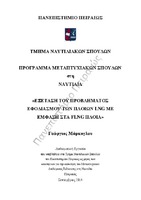| dc.contributor.advisor | Παπαδημητρίου, Ευστράτιος | |
| dc.contributor.author | Μάρκογλου, Γεώργιος Α. | |
| dc.date.accessioned | 2015-05-13T10:53:42Z | |
| dc.date.accessioned | 2015-06-19T14:42:52Z | |
| dc.date.available | 2015-05-13T10:53:42Z | |
| dc.date.available | 2015-06-19T14:42:52Z | |
| dc.date.issued | 2015-05-13T10:53:42Z | |
| dc.identifier.uri | https://dione.lib.unipi.gr/xmlui/handle/unipi/6594 | |
| dc.description.abstract | Το φυσικό αέριο είναι ένα ορυκτό καύσιμο, το οποίο λόγω της σύστασής του, συμβάλει σε μέγιστο βαθμό στη μείωση των εκπομπών αερίου του θερμοκηπίου. Το εμπόριο του πραγματοποιείται είτε μέσω αγωγών, είτε υγροποιημένο μέσα σε κρυογόνες δεξαμενές μέσω πλοίων, φορτηγών και τραίνων. Στην δεύτερη περίπτωση, απαιτούνται κάποιες εγκαταστάσεις για την υγροποίησή, αποθήκευσή και επαναμετατροπή του σε αέρια μορφή, αλλά και εξειδικευμένα πλοία μεταφοράς υγροποιημένου φυσικού αερίου. Στις μέρες μας, έχει δημιουργηθεί ένας νέος τύπος πλοίου, με την ονομασία FLNG, το οποίο ουσιαστικά αποτελεί μία πλωτή εγκατάσταση υγροποίησης και αποθήκευσης φυσικού αερίου. Το πρώτο πλοίου τέτοιου τύπου κατασκευάστηκε από την Shell με την ονομασία Prelude και έκανε το παρθενικό του ταξίδι το Δεκέμβριο του 2013. Στη συγκεκριμένη μελέτη έγινε προσπάθεια να αναλυθεί, πως η τοποθέτηση ενός αντίστοιχου πλωτού τερματικού σταθμού υγροποίησης φυσικού αερίου στην Κυπριακή Αποκλειστική Οικονομική Ζώνη (Οικόπεδο 12) για την εκμετάλλευση των κοιτασμάτων της ευρύτερης περιοχής της νοτιοανατολικής Μεσογείου, θα μπορούσε να αποτελέσει μία επικερδή επένδυση. | |
| dc.language.iso | el | |
| dc.subject | Liquefied natural gas -- Transportation | |
| dc.subject | Υγροποιημένο φυσικό αέριο | |
| dc.subject | Πλοία | |
| dc.title | Εξέταση του προβλήματος εφοδιασμού των πλοίων LNG με έμφαση στα FLNG πλοία | |
| dc.type | Master Thesis | |
| europeana.isShownAt | https://dione.lib.unipi.gr/xmlui/handle/unipi/6594 | |
| dc.identifier.call | 338.476 657 4 ΜΑΡ | |
| dc.description.abstractEN | Natural gas is a fossil fuel, which due to its composition, has a dominant role to the reduction of the greenhouse gases emissions. The trade of natural gas takes place through pipelines or in its liquefied condition into cryogenic tanks by ships, trucks and trains. In the second case, special plants for its liquefaction, storage and regasification are needed, and of course LNG carriers. Nowadays, we have witnessed a new entry in the LNG market, the FLNG ship. This type of ship is an offshore floating LNG plant, where the liquefaction and storage processes take place. The first FLNG ship, “Prelude” was constructed by Shell and made its first journey in December 2013. Motivated by this new entry, this study is tried to analyze how the investment of the construction of a new FLNG ship and its anchorage in the 12th block of the Cypriot Exclusive Economic Zone, could be the ideal solution for the exploitation of the LNG fields of the southeastern Mediterranean Sea and subsequently be profitable for all the participating parts of the deal. | |


